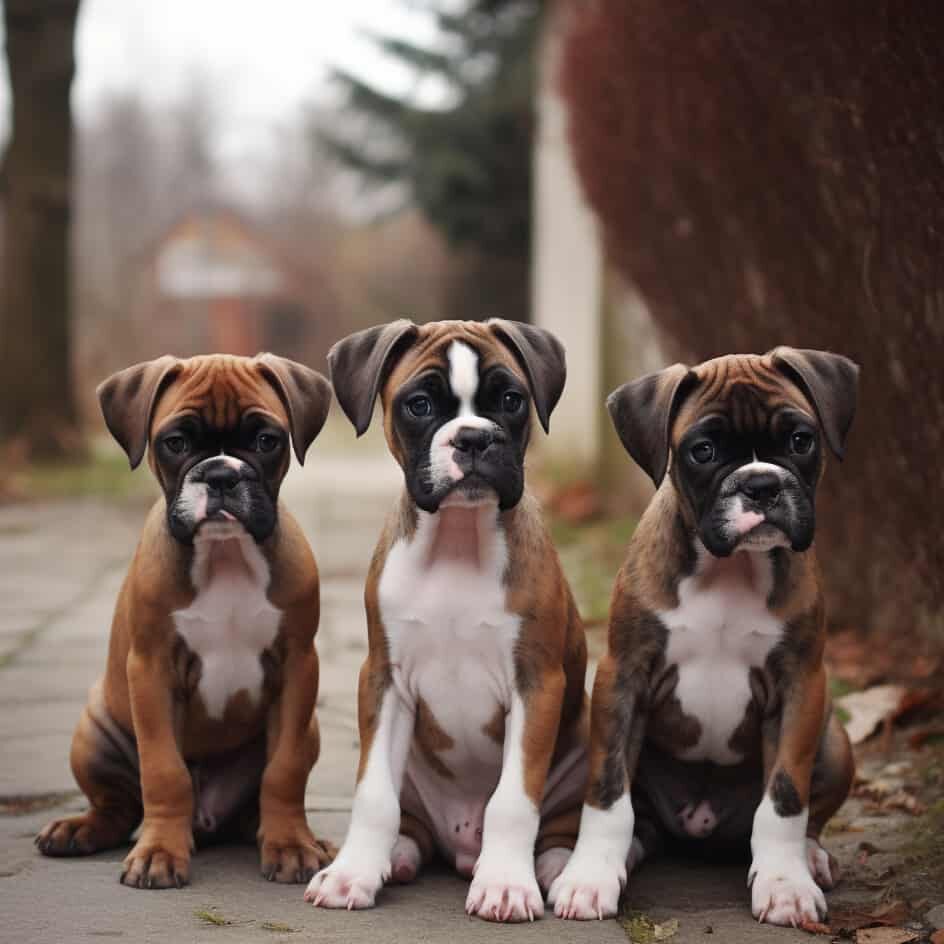Paris, France
The Boxer is a Dog Breed appreciated for her loyalty, energy and unique personality. With its erect ears, short muzzle and powerful musculature, the Boxer is easily recognizable. This dog breed originated in Germany first appeared in the 1800s. Today, the Boxer has become a popular dog breed around the world, largely due to its charming personality and loyalty to its owners. In this article, we'll take a closer look at the Boxer dog breed, including its physical appearance, character, care and maintenance needs, and its role in popular culture. So whether you're a Boxer owner or simply a dog lover, you'll discover everything you need to know about this fascinating breed
The Boxer: origin and history of the breed
The Boxer is a Dog Breed German that was first bred in the 19th century. The ancestors of the Boxer were hunting dogs used to hunt game and wild boars in Germany. In fact, the first boxers came from a cross of english bulldogs, of mastiffs and other dog breeds.
The name "Boxer" was chosen for this breed because of its natural inclination to stand on its hind legs and strike with its front legs, similar to a boxer. At first, the Boxer was used as a working dog for German butchers and farmers. However, this breed quickly became popular due to its charming personality traits and loyalty to its owners.

The Boxer: physical characteristics
The Boxer has powerful musculature and a compact body, as well as a short and broad muzzle. The Boxer's ears stand up naturally and its coat is short and shiny.
The size and weight of the Boxer
| Size at the withers | The weight | |
| Male | 57 to 63 cm | 30 to 35 kg |
| Female | 53 to 59 cm | 25 to 30 kg |
Boxer coat colors
The Boxer has a short, shiny and smooth coat that can be of several colors. The most common color is fawn, which varies from light to dark, but there are also Boxers with a black coat or brindle.
The fawn can be uniform or with white markings on the belly, neck, legs and head. Fawn Boxers with white markings are often called “White Marking Boxers” or “White Boxers”. It is worth noting that pure white is not an acceptable color for the breed, and the presence of excessive white spots or large white spots may be considered a failure to conform to the breed standard.
THE Black boxers are less common, but they are just as beautiful. They have a black coat with white markings similar to those of fawn Boxers. THE Brindle boxers have a coat with a pattern of brown or black stripes on a fawn or red background.
In all cases, the Boxer's coat must be shiny, smooth and well fitted to the body. Regardless of coat color, Boxers have a charming and affectionate temperament that makes them popular as pets.

The Character and Behavior of the Boxer
General temperament
The Boxer has a charming and affectionate temperament. He is very loyal to his family and loves spending time with his owners. The Boxer is also a protective dog, who watches over his family and is often suspicious of strangers. This makes it a good watchdog.
Exercise Needs
The Boxer is also a very energetic and playful dog. That is, he needs daily exercise to stay healthy and happy, and he enjoys playing with his owners and their toys. However, it is necessary to note that the Boxer can be quite rambunctious when young, and tends to be very enthusiastic when playing.
Training and socialization needs
Originally a working dog, the Boxer is also very intelligent and easy to train. He is very receptive to training and can be trained for many tasks, such as obedience, agility or search and rescue.
Relations with children and other animals
Finally, the Boxer is also known for his love of children. He is a very patient and gentle dog with children, and is often recommended as dog breed for families with children. He is also very sociable with other animals in the house.
Common Health Problems in Boxers
As with any dog breed, the Boxer can exhibit some common health problems. Here are some of the most common health problems in Boxers:
- Cancer: The Boxer is prone to several types of cancer, including Lymphoma, Soft Tissue Sarcoma, Melanoma and skin cancer.
- Heart Problems: Boxers are also prone to certain heart problems, including dilated cardiomyopathy and aortic stenosis.
- Allergies: Boxers may be prone to food, environmental or contact allergies.
- Respiratory problems: Boxers sometimes suffer from respiratory problems, some developing brachycephalic syndrome, which is caused by their short and compact head and muzzle.
- Hip Dysplasia: Hip dysplasia is a joint disease that can affect Boxers, especially those who are older. It can cause pain and discomfort.
It is essential to ensure that your Boxer receives regular veterinary care to prevent or treat these health problems. Indeed you must choose a trusted breeder who carries out screening tests on the puppy's parents to ensure that there are no genetic predispositions to these health problems.
Tips for Maintaining the Health of Your Boxer
Here are some tips for keeping your Boxer healthy:
- Physical Exercise: Boxers are very energetic dogs who need daily exercise to stay healthy. Make sure to give them plenty of exercise by taking them for regular walks and letting them play and run around.
- Balanced diet: Boxers need a balanced, quality diet to maintain their health. To do this, make sure you give quality food, adapted to their age and activity level. Avoid fatty or rich foods which can cause health problems.
- Avoid stressful situations: Boxers can be sensitive to stress, which can affect their health. This is why you will avoid stressful situations as much as possible and make sure they have enough rest and relaxation time.
By following these tips, you can help keep your Boxer healthy and happy.

Care and maintenance
- Regular Visits to the Vet: It is important to make regular visits to the veterinarian to ensure that your Boxer is healthy and to catch any health problems early.
- Vaccinations and preventive treatments : don't forget to keep your Boxer's vaccinations and preventive treatments up to date, such as dewormers and flea and tick treatments.
- Hygiene and care: Be sure to brush your Boxer's coat regularly to remove dead hair and prevent tangling. Boxers also need good dental hygiene, so be sure to brush their teeth regularly and give them bones to chew on to help them maintain healthy teeth and gums.
Food and nutrition
Diet and nutrition are important aspects of Boxer health. Here are some feeding and nutrition tips for Boxers:
- Balanced diet : Boxers need a balanced, quality diet to maintain their health. This is why you should give quality food, adapted to their age and activity level. Avoid fatty or rich foods which can cause health problems.
- Amount of Food: Boxers tend to gain weight easily, so it is essential to monitor the amount of food they eat. Ask your veterinarian for advice on determining the appropriate amount of food for your Boxer based on his age, weight and activity level.
- Meal Frequency: Boxers need several small meals throughout the day rather than large meals. Your Boxer will like to eat at least two meals a day.
- Quality Protein: Boxers need a diet rich in quality protein to maintain muscle mass. Note that quality protein sources for Boxers include chicken meat, beef, pork and fish.
- Vitamins and Minerals: It should be noted that Boxers need vitamins and minerals to maintain their health. Therefore make sure their diet contains enough essential vitamins and minerals such as vitamin E, vitamin C, zinc and selenium.
- Clean, Fresh Water: Make sure your Boxer has access to clean, fresh water throughout the day to prevent dehydration.
Conclusion
To finish the Boxer is a Dog Breed incredibly endearing and loyal who requires good education, regular exercise and a balanced diet to stay healthy and happy. Boxers have a unique character that makes them popular with many dog owners, but they also require special attention when it comes to health, especially regarding common heart and respiratory problems. Obviously by choosing to own a Boxer, you are committing to providing your pet with appropriate care throughout its life. That said with proper training and care, your Boxer can be a loving, loyal and happy companion for many years to come.






